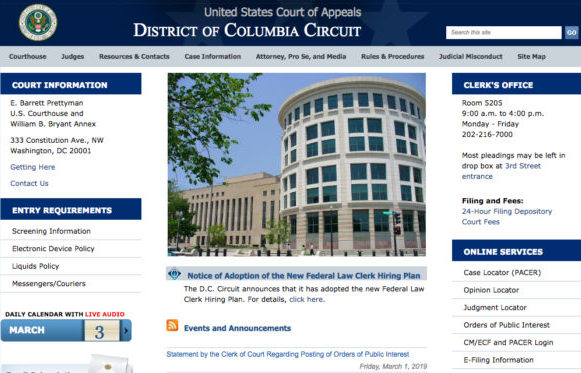The D.C. Circuit will provide free online access to the orders it issues in certain closely watched cases, the court announced Friday (March 1).
In “cases of exceptional public interest,” the court said it will post on its website any orders of the court resolving motions, petitions and appeals. The court already posts all opinions and judgments on its website, but to access court orders, a person typically needs an account with PACER, the byzantine database of federal court documents. PACER charges a fee for every document viewed.
The page where the D.C. Circuit will post the orders is here. On that page, people can also sign up for email alerts notifying them any time an order is posted there.
The court’s announcement did not explain how a case will qualify as having “exceptional public interest.” The first document the court posted under the new policy is an order in Guedes v. Bureau of Alcohol, Tobacco, Firearms and Explosives, a case challenging the Trump administration’s December 2018 regulation banning “bump stock” devices. In the order in Guedes, the court granted the challengers’ request for an expedited appeal and scheduled oral argument for March 22—four days before the bump stock ban is scheduled to take effect.
The new policy on the posting of orders is the second second toward greater transparency that the D.C. Circuit has taken in the last year under Chief Judge Garland. Last summer, the court began providing live audio streams of all oral arguments.
Still, even under the D.C. Circuit’s new policy, the vast majority of important case documents—including all motions and briefs, as well as court orders in non-“exceptional” cases—will remain behind the PACER paywall.
A class action lawsuit currently pending in the U.S. Court of Appeals for the Federal Circuit argues that PACER’s fee structure violates the E-Government Act, which authorizes fees “only to the extent necessary” to cover the cost of making records publicly available. In January, seven retired federal judges submitted an amicus brief in the case arguing that PACER should be free. Those retired judges include the former lion of the Seventh Circuit, Judge Richard Posner—but nobody from the D.C. Circuit.
![]()

